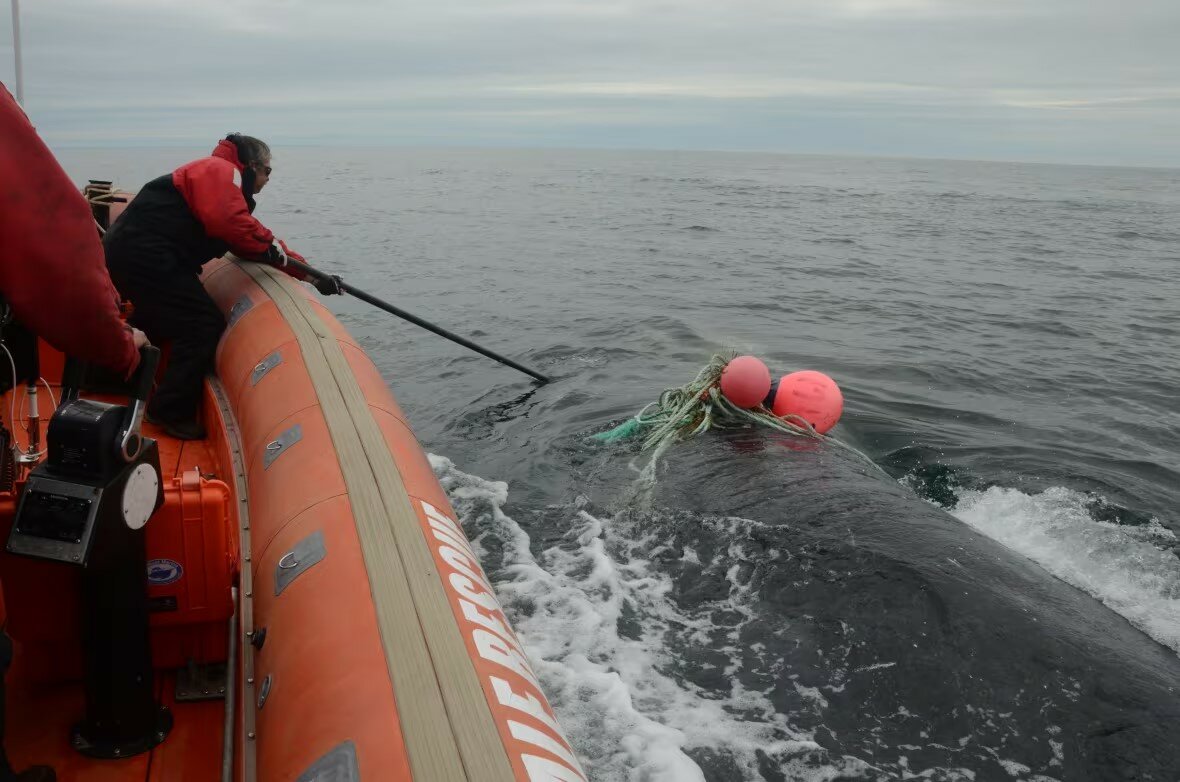People and Other Creatures: Can We Live Together?
In 2023, North Atlantic right whale #1812 - War - gave birth to her seventh known calf along the shores of the Southeast United States.
Her curious calf was spotted entangled in the Gulf of St. Lawrence on June 22, 2024, by researchers with the Campobello Whale Rescue Team and colleagues. The calf had a rope lodged through the mouth, around the right flipper and trailing behind.
War’s calf was last spotted in the waters off North Florida on February 16, 2024, gear-free.
It is not known where the entanglement occurred and researchers noted the calf was alone. The rescue team was able to attach a telemetry buoy to the trailing line entangling the young whale. Satellite systems kept track of the whale while researchers hatched a plan to free the whale from the rope. Rescuers were successful in removing most of the rope from the entangled whale. Only a small amount remained in the baleen, leaving everyone hopeful the whale would shed it on its own.
This whale rescue took place seven years to the day that Joe Howlett, a founding member of the Campobello Whale Rescue Team, was tragically killed disentangling another North Atlantic right whale in the Gulf of St. Lawrence. Researchers involved felt Joe’s presence during the rescue of War’s calf, according to their press release.
Whales are highly intelligent living beings who share emotional bonds. Think about the mother right whale who gave birth off our shores this past winter. Her calf was hit by a small vessel leaving it unable to feed. Scientists witnessed the mother of this calf expressing milk into the water hoping her baby would be able to feed while healing. The calf did not survive.
Consider Farley Mowat. He was a naturalist and author passionately interested in the common bond between humans and other animals. He authored "The People of the Deer," "Never Cry Wolf" and "The Siberians." Even though these books were written decades ago, his words remain potent.
Mowat shares with us the following story of a very old man at Hermitage Bay:
One Saturday afternoon he was homeward bound from his work at a whale factory when he saw a pod of finners. There were three of them, and they were behaving in a peculiar fashion. Instead of briefly surfacing and then sounding again, they were cruising on top. Their course converged with his as he was rowing, and they drew close, my friend saw that they were swimming, as he put it, “shoulder to shoulder.” The center whale was blowing much more rapidly than the rest and its spray was pink in color.
“Twarn’t hard to know what was the trouble,” the old man remembered. “Yon middle whale had been harpooned and the iron had drawed up and he’d got clear of the catcher boat. The bomb must have fired, but no deep enough for it to kill he.”
“I laid back on me oars, not wantin’ to get too handy to them three, but they never minded I … just steamed slow as you please right past me boat, heading down the bay and out to sea. They was close enough so I could near swear the two outside whales was holding up the middle one. I t’inks they done it with their flippers. That’s what I t’inks… They two other whales took the sick one off someplace … some said ‘twas to the whales’ burying ground … but all I knows is they kept that sick one afloat somehow for five days, and close onto sixty miles.”
Just this morning, I received a notice from someone I cherish dearly. Weh’na Ha’mu Kwasset—Sherri Mitchell, a Penobscot elder and environmental attorney, shared her latest published essay, “Kincentric Circles.”
In her essay, Sherri shares with us, “It’s time for humans to begin relating to ourselves, and the rest of the living world, as exactly that: related.” She also wrote the following:
“Instead of learning to take greater responsibility for one another, we have maintained heart-wrenching dehumanization for millennia and amped up ethno-nationalist polarization. This has created new waves of intraspecies violence and set the stage for unprecedented rates of interspecies destruction. Last year, the United Nations reported the highest number of violent conflicts since World War II. In 2019, an Intergovernmental Science-Policy Platform on Biodiversity and Ecosystem Services report stated that up to a million plant and animal species were on the verge of extinction.”
The North Atlantic right whale, like many other species, is on the verge of extinction. We must begin to relate to ourselves as related to all, including right whale calves born along our shores, if we ever expect to save them.
Joe Howlett was a rare breed of human. His disposition was not self-serving. He gave his life to save the life of another species, a whale. His courage and empathy are not forgotten. Rest in peace brave soul, rest in peace.






